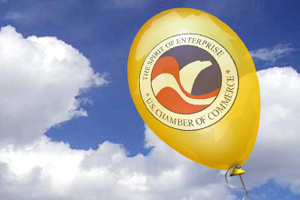 Leaders of some of the largest urban chambers of commerce are distancing themselves from the US Chamber in the wake of recent controversies over its inflated membership numbers, undemocratic structure, and right-wing policy positions. In recent interviews, they strongly disagreed with the national group’s positions on health care and climate change and disputed its implicit claim to speak for their members.
Leaders of some of the largest urban chambers of commerce are distancing themselves from the US Chamber in the wake of recent controversies over its inflated membership numbers, undemocratic structure, and right-wing policy positions. In recent interviews, they strongly disagreed with the national group’s positions on health care and climate change and disputed its implicit claim to speak for their members.
“They don’t represent me,” says Mark Jaffe, CEO of the Greater New York Chamber of Commerce, which is a dues-paying member of the national group. He added that the Chamber’s “parochial interests”—large corporations that control its self-appointed board of directors—”are well represented.”
Jaffe also scoffed at the US Chamber’s oft-repeated claim to “represent 3 million businesses of all sizes, sectors, and regions.” Yesterday Mother Jones questioned the number, which appears to be based on the idea that the Chamber “represents” the members of the New York Chamber and similar local groups. That number of members would comprise more than half of the 5.7 million employers in the United States. “They are playing games” with their numbers, Jaffe said. “They don’t have half the businesses in America as registered, dues-paying members.”
The New York Chamber has no plans to leave the national Chamber (its annual membership dues are only $1000 per year), yet neither is Jaffe happy with the group. “We get involved in some of their activities,” like working to modernize airports, he said, “but we don’t agree with all of their principles either, like their position on health care. You have to be selfish, blind, or stupid not to want everybody to be required to have health care.”
Jaffe’s objections to the US Chamber’s policies were echoed by Rob Black, vice-president of public policy for the San Francisco Chamber of Commerce. “We take a fundamentally different approach than the US Chamber,” he said, adding that while the national Chamber opposes the Waxman-Markey climate bill, “we support a market-driven cap-and-trade system. It’s good for business, but it’s also a good way to try to spur innovation and new technologies.”
Like some other local chambers of commerce, the San Francisco Chamber automatically enrolls its members in the US Chamber, a service that the national group offers free of charge. Yet Black downplayed the relationship. He noted that while San Francisco-based Pacific Gas & Electric dropped out of the US Chamber in protest of its climate policies, it has retained its local membership.”We don’t do a whole lot with the US Chamber,” he said. “It’s just a loose federation of business organizations.”
Indeed, the work of many local chambers often seems at odds with the US Chamber’s fiercely anti-regulatory ideology. The San Francisco Chamber endorsed California’s strict climate legislation and the mayor’s initiative to require mandatory recycling. Jaffe of the Greater New York Chamber speaks approvingly of local efforts to ban trans-fats and smoking in bars. “Without the US Chamber we would still be running the same programs and services,” he says. “A lot of it is just political. We join to support the Chamber. It gives us the opportunity to meet people.”
Local chamber officials say membership in the US Chamber—which is most likely closer to 200,000 businesses—could be defined many ways. “Some of those 200,000 people were getting a magazine to the tune of $14 a year,” Jaffe pointed out. “So I don’t know. . .”














